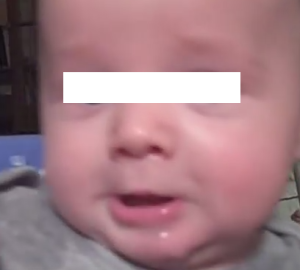According to Children’s Health Network, spitting up is known as gastroesophageal reflux or reflux. Infants will often spit up when they are fed and it occurs with a burp. Spitting up does not normally cause harm to the baby or make her cry. However, mothers need to differentiate between spitting up and vomiting. A vomit shoots out inches because the flow is forceful but a spit up is rather a dribbling from the mouth. The clear liquid that is seen during spit up is usually saliva.
Sometimes, the spit up may have milky-white liquid, which is breast milk or formula fed to the baby. While spitting up clear liquid in infants may not be a problem, at times, when it interferes with the nutrient intake, it may result in other health issues. In case a child is spitting up frequently even when she has not been fed, she might be ill.
You want to watch the pattern in which the baby spits up and find out if she is doing that when she hasn’t been fed and whether it is frequent or not. Spitting up isn’t forceful and it doesn’t come out with large amounts of fluids or food. It is common in infants and may be considered normal with no harm.
The incident of a baby spitting up clear liquid may occur right after the baby has been fed or when she burps. Burping is belching and is common when you have fed a baby. During the time she is burping, she may release clear liquid. At times, the liquid will contain content of the food, milk, or formula she has been fed.
Types of spit up in infants
There are various types of spit up in infants. The common one is the fairly watery fluid containing a few chunks of some white, cheesy creamy content or stuff in it. Such kind of spit up is pretty seen quickly after feeding a baby. It may be common in infants who tend to have excess drool.
A spit up that is clear liquid is mainly made up saliva. A spit up with white chunks is one that is triggered by burping and brings up partially curdled milk. It is a natural reaction to have curdling in babies because of the stomach acids. Curdling is also part of the process of digestion in babies. The curdled milk will mix with excess saliva found in the throat and mouth of the baby.
There is another kind of spit up which consists of large amount of chunky stuff that appears milky white. This comes from the tummy of the baby and is due to strong gag reflex, which is accidentally triggered by a burp. It also may be induced by a toy, finger, or pacifier. Too much horsing around when you have just fed the baby may result in this kind of spit up. In rare cases, though, the baby will spit up due to nausea from an illness.
Why is spitting up common in babies
Spit up is common among otherwise healthy babies. It is estimated that more than half of babies have gastroesophageal reflux or infant reflux in the first three months following their birth. The main reason why babies tend to spit up often is because there is a valve known as lower esophageal sphincter, which is not fully developed.
During this time it is developing, a baby will spit up often. The lower esophageal sphincter valve is located between the stomach and esophagus and helps keep content in stomach so that it does not flow back to the throat and mouth. Until the valve develops, a baby will continue spitting particularly when they eat too much.
Is there harm when a baby is spitting up too much?
In most cases, even when a baby is spitting up too much, there is no harm. Provided that the baby is feeding well and adequately, and is having a number of dirty and wet diapers, while the weight is increasing, then it means she is having sufficient food even after spitting.
It may seem like the baby spits up a lot. However, it is very rare that a baby will empty or spit up all the feeding she has had. When a baby feeds, digestion starts immediately. In a baby who is about 3 to 4 months, digestion takes place at a rate of about 30 ml of milk or formula in every 10 to 15 minutes.
Therefore, a baby who takes about 150 ml in a feeding that lasts 20 minutes, it means that by the time she finishes feeding, already much of it has been digested. In case she empties out content in the stomach after those 15 minutes, it would mean most of it has been digested. Sometimes, there may occur nutritional issues when the baby spits too much.
You should worry about the health of the baby when she is spitting up and showing symptoms like reduced weight gain or not gaining weight. The baby is vomiting forcefully or spits up green and yellow, or fluid that has blood in it. When the baby refuses to feed and the stool has blood, you may be worried if she is spitting up often. In these cases, consult with a pediatrician. Also, if the baby spits up clear liquid and experiences difficulty in breathing, also seek help of doctor.
How to limit spitting up in babies
To reduce incidents of spitting up in babies, keep the baby upright after feeding for about 30 minutes. Try feeding her small but more frequent feedings. Take time to help burp her and put her on sleep by the back.

